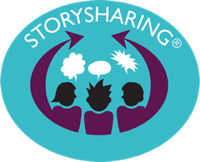Independent research has shown that Storysharing® works. The approach has been described and documented in various papers in practice focused journals. Funded projects with evaluation reports have been undertaken as follows:-
With adults- 2002-3; 2008-2011; 2009-2011; 2013-2014;
involving a total of 17 residential homes, and 2 day services and involving around 120 adults, nearly 200 staff members and around 15 families.
With youngsters -2007-2008; 2011-2014; 2015-2018;
12 special schools and two mainstream schools with attached units, involving over 250 pupils with special needs and disabilities, 180 staff and over 50 families. In 6 schools the work was done with pupils aged 11-19, and illustrated that considerable progress could be made with young people at the end of their school careers.
Selected references
Bunning, K., Gooch, L. and Mohammedson, M. (2017), Developing the personal narratives of children with complex communication needs associated with intellectual disabilities: What is the potential of Storysharing®? J AJournal of Applied Research in Intellectual Disabilities 30: 743-756
Bunning, K., Muggeridge, R. and Voke, K. (2018), Teachers and students with severe learning difficulties working together to co‐construct personal narratives using Storysharing®: the teacher perspective. Support for Learning, 33: 23-37.
Foundation for People with Learning Disabilities (2012) Involve Me Independent Evaluation Report.
Grove. N., et al. (2010). Sharing stories of everyday life with adults and children who have severe/profound intellectual disabilities. In V. Prasher (ed) Contemporary Issues in Intellectual Disabilities. Nova Publishers. pp. 225-230.
Harwood, J. (2018) Storysharing for All: Report to Paul Hamlyn Foundationhttps://storysharing.org.uk/wp-content/uploads/2021/05/Storysharing-for-all-2015-18.pdf
Harwood, J. (2014) Storysharing in Schools: Report to Paul Hamlyn Foundationhttps://storysharing.org.uk/wp-content/uploads/2021/05/STORYSHARING-IN-SCHOOLS-FINAL-REPORT-2011-2014.pdf
Harwood, J. (2011) Storysharing in Somerset 2008=2011: Final Report to Somerset LDDF boardhttps://storysharing.org.uk/wp-content/uploads/2021/05/STORYSHARING-IN-SOMERSET-2008-2011-FINAL-REPORT.pdf
Peacey L. (2009). A storytelling project located in two sets of mainstream and special schools: City and Country. London University Institute of Education.https://storysharing.org.uk/wp-content/uploads/2023/03/Storytree-report.pdf
Narrative theories and research foundations of Storysharing®
Disability models and principles
Links with other programmes and interventions
